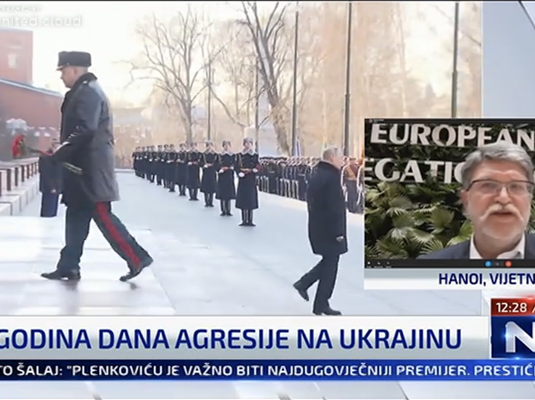Picula recalled the beginning of Russian aggression when he took part in the EU mission in Ukraine at the beginning of February last year, asserting that at that time there was an intense feeling that an open war like the one being waged today would begin.
The representative concluded that this war was a turning point in recent European history. "The invasion reshaped political and international relations outside the European Union, as I can testify from Vietnam, where I traveled from Indonesia to talk with my colleagues from the Foreign Policy Committee to the leaders of the ASEAN group, an association of 10 Southeast Asian countries that want to follow the example of the European Union."
In response to a journalist's question about the state of the Union, Picula said: "As for the European Union itself, it has survived this past year in uncertain circumstances, although many predicted that it would not survive such a geopolitical earthquake. EU managed to position itself uniquely, and many political taboos fell. Also, in addition to sending weapons to Ukraine to defend its immediate neighborhood, the EU was forced to borrow from the international financial markets during the pandemic, and now, for the first time, it jointly invests in defense capacities and openly supports a country that is a victim of aggression."
Regarding the new order, Picula said that there are still many cracks for which we need to be careful, but now it is completely certain that the EU will never again be dependent on Russian energy products, and must also reduce its dependence on the Chinese market.
"One of the goals of Russian aggression was certainly to separate the European Union from the United States of America and restore Russian influence. However, that did not happen and NATO was strengthened by two new members that would not have become so if there were no such circumstances. Putin thought that Europe would capitulate because of its heavy dependence on energy sources, but instead, the EU decided to expand and move away from harmful dependencies."
Asked about the fact that certain countries in Europe are historically in favor of Russia and that this would result in additional problems, Picula referred to BiH, which has been granted candidate status but is still far from the beginning of real integration into the EU, precisely because of the non-acceptance of sanctions against Russia.
"The EU will have to have a much more principled attitude towards the Western Balkans, and uncompromising synchronization in security policy is expected from all member countries and candidate countries. An insufficiently tough approach could have harmful consequences, so the European Commission will have to step up its diplomatic efforts."
Regarding the possible outcomes and deadlines for the end of the war, Picula said that Ukraine will by no means agree to territorial concessions and believes that this war will last longer than the estimated 6 months.


